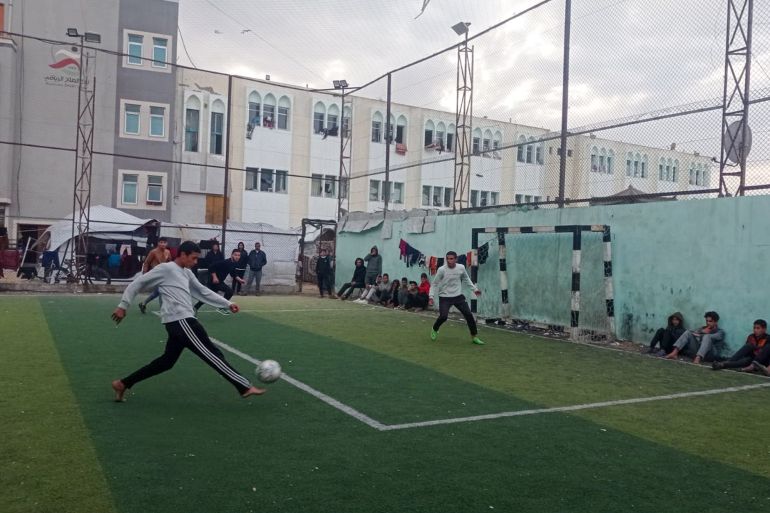How Israel’s war on Gaza has changed Ramadan football
A five-a-side football tournament at a refugee camp for displaced Palestinians brings momentary joy amid the war.

Deir el-Balah, Gaza – For over six years, Moath Raja Allah was known as one of the top players in Gaza’s Ramadan football tournaments.
The 19-year-old from Nuseirat collected 12 trophies and countless accolades for his skills.
Keep reading
list of 3 items‘In Gaza, football is the only escape’: Palestine star Mahmoud Wadi on war
‘Sport is part of our resistance’: Palestine football chief Jibril Rajoub
This year, Raja Allah is spending Ramadan at a makeshift refugee camp at Al-Salah Football Club in Deir el-Balah, located in the central Gaza Strip, after his family was displaced during Israel’s war on Gaza.
His only wish is to be able to buy a chicken for his family for iftar and break his fast on the rubble of his home, which was destroyed by Israeli bombardment that also left a shrapnel wound on his head.
“Ramadan tournaments are not the same anymore,” Raja Allah tells Al Jazeera.
“They lack the rivalries, the passion and the celebratory atmosphere of the past years.
“What’s more, we have now been reduced to playing for a pack of food aid package instead of a trophy.”
More than 1,000 people displaced by the war have taken refuge at Al-Salah Football Club, where football matches and training sessions came to a halt five months ago.
However, in order to offer momentary distraction to the families living on its premises, the club has been running a five-a-side football tournament during Ramadan.
“By organising this tournament, we are trying to deceive ourselves and say there’s a life in Gaza,” said Nabeel Abu-Asr, the club’s director of sports activities.
“We will give awards to the top two teams, but it will probably be a very small amount of money or a food aid package,” he said with a despondent shrug.
“It feels wrong, but we want to bring them some joy.”
![Two teams gather in the middle of the pitch before the start of a match during a Ramadan football tournament at Al-Salah Football Club in Gaza [Abubaker Abed/Al Jazeera]](/wp-content/uploads/2024/03/Two-teams-stand-before-the-whistle-of-the-second-semi-final-of-the-tournament-1711545116.jpg?w=770&resize=770%2C513)
‘We are no longer children’
Despite being a far cry from the Ramadan tournaments of old, this event offers brief moments of joy to the players and their family members.
Mothers beam with pride when their sons score a goal. Younger children cheer every move from the sidelines and those on the pitch mimic their football idols’ celebrations.
Barefoot teenagers, or some with ripped boots, showcase their skills on a futsal-sized court surrounded by residential blocks on one side and a street lined with date palm trees on the other.
The sound of Israeli drones hovering in the area is momentarily drowned by the crowd’s cheering.
Once the action is over, the realities of the ongoing war again set in.
For 12-year-old Real Madrid fan Karam Al-Hwajri, football serves as a reminder of his life before the war.
“I find solace on the football pitch,” he said after finishing a game.
He prefers playing as a goalkeeper but doesn’t mind stepping further down the field to be part of the action.
“I know I will be killed, so I want to enjoy the last moments of my childhood.”
Despite his young age, Al-Hwajri is aware of the burdens of the war and says what Gaza’s children have endured is “beyond anyone’s ability”.
“We are no longer children.”
![Karam Al-Hwajri (right) reacts to a shot during a Ramadan football tournament at Al-Salah Football Club in Gaza [Abubaker Abed/Al Jazeera]](/wp-content/uploads/2024/03/Karam-Al-Hwajri-in-blue-reacts-to-a-shot-1711545333.jpg?w=770&resize=770%2C513)
Dreams of football, school and shawarma
Khalil Al-Kafarneh, a 16-year-old player, has lived through several displacements since October. The 10 members of his family left their home in Beit Hanoon, located in northern Gaza, soon after the war broke out.
The camp at Al-Salah Football Club has been their home for three months, but they are struggling to survive, with limited supplies of food and clean water.
Al-Kafarneh has been playing football for 10 years; he says the war has taken away his athleticism and skills.
![Khalil Al-Kafarnah (right) in action during a Ramadan football tournament at Al-Salah Football Club in Gaza [Abubaker Abed/Al Jazeera]](/wp-content/uploads/2024/03/Khalil-Al-Kafarnah-in-Real-Madrid-T-shirt-is-pressing-to-take-the-ball-1711545481.jpg?w=770&resize=770%2C513)
“I rarely kick a ball now. I am a high school student but have not been able to continue my studies. My house is a pile of rubble. There’s nothing left.”
The aspiring footballer wanted to represent Ittihad Al-Shujaiyya, one of Gaza’s most prominent clubs. Then the war crushed his dreams and bombs hit the club’s premises.
More than 90 Palestinian footballers in Gaza, including legendary forward Mohammed Barakat, have been killed during the war with Israel.
Some of Gaza’s most famous stadiums, including Al-Yarmouk Stadium and Gaza Sport Club, have been destroyed or taken over by Israeli forces.
The United Nations has termed the Gaza Strip a “graveyard for thousands of children”.
Since October 7, Israeli attacks have killed at least 13,000 children, according to the UN Children’s Fund (UNICEF). Thousands more are missing under the rubble, most of them presumed dead.
A large number of those who have survived have sustained injuries and suffer from malnourishment due to scarcity of food, as well as the trauma of war.
Seven-year-old Nadeen Isa and her family moved to Al-Salah Football Club in January after their house was raided by Israeli forces in Rafah, southern Gaza.
She has been surviving on canned food since the start of the war and says she misses her favourite food: a shawarma sandwich. But Nadeen’s ambition remains unbroken.
“I dream of becoming a nurse and a striker,” she said while watching a football game from the sidelines.
“I wish I were born in a different country, so I could play and learn like any other child. I miss my school friends, my home and sitting under its roof.”